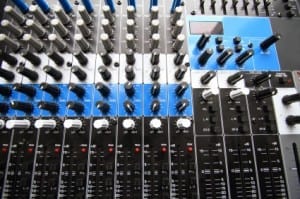Should You Edit Performances to ‘Tighten’ Your Mix?
Digital recording has opened up an enormous amount of new recording possibilities, not the least of which is the ability to easily tighten your performance by editing your mix. What used to require extremely meticulous time spent taking a razor blade to tape back in the analog days (which was really an art form in and of itself) can now be done by moving a note around with a mouse. Not only that, you can move all of the notes around if you want to provide a tight, “perfect” performance.

But questions soon arise: just because you have the ability to make these minute edits, does that mean that you should make them? What exactly is the definition of the word “perfect” in context of a recording studio?
Just like most things in the recording world, there’s no clear cut answer. But here are a few considerations to make when deciding if (and how much) you are going to edit your recorded tracks.
What Is Your Overall Goal?
There are many types of music out there, and to an extent, they all have different goals. A producer recording a folk acoustic artist likely is not trying to make a record that also appeals to Katy Perry fans. Therefore the goals of the song are different.
And this fact is seen long before you get to the editing stage. A pop song with aspirations for the Top 40 may be filled with drum machines, synthesizers, MIDI instruments. That is to say, it’s going to be populated with digital instruments going directly into the DAW, providing an inherently “unnatural” (read: non-acoustic) sound.
That’s not a bad thing – but it must be remembered that listeners may be expecting (subconsciously) a perfect song in terms of timing. After all, if a drum machine is being used to create a beat that is absolutely in perfect time, a bass line that is even slightly out of time is not only going to stick out as a major imperfection.
On the other hand, that folk artist may want to keep the imperfections in the music that are inherent to human performance. The goals are different – instead of a song with a solid beat, the folk musician may be more concerned with the raw emotion of the performance.
Drummers have been known to yell at producers who try to do too much editing on the drums, claiming that making a drum track perfectly in time takes away the subtle feel and vibe they’ve learned to convey in their drumming through many hard years of practice. As always, you must remember that it is your job as a producer to serve the song, whatever the goals of the tune may be.
Can You Use Editing to Overcome your Short Comings
Many home recording engineers only record themselves – and therefore must play all of the instruments. Naturally, this typically means that you’ll have some instruments you are better at performing than others.
In these cases, performing some editing – particularly on instruments that aren’t your strong suit – can be a great way to produce great recordings without having to rely on others to come in and play different parts.
Editing in Moderation
Regardless of how you record and what type of songs you are recording, the best solution is often to edit judiciously. Instead of moving every single drum hit, just line up the first down beat of the song, as well as the downbeat of every chorus.
Making time edits to all your instruments (not just drums) at important parts in the song can create a harder hitting, more impactful sound without lending the tune an unnatural feel.




